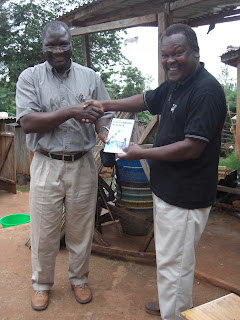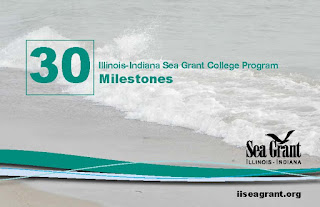February 18th, 2013 by Irene Miles
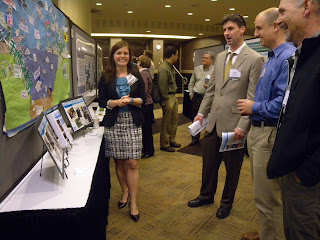 IISG’s Caitie McCoy attended the Seventh International Conference on Remediation of Contaminated Sediments last week to present her community outreach work with the Great Lakes Legacy Act (GLLA). The conference traditionally features environmental scientists and engineers, but that is changing. “We are starting to see more attention paid to community engagement at these types of conferences,” Caitie tells us. “Technical project managers realize that projects are easier to implement when the community understands and supports the work, and so they’re eager to learn from professionals who specialize in community engagement and stakeholder involvement.”
IISG’s Caitie McCoy attended the Seventh International Conference on Remediation of Contaminated Sediments last week to present her community outreach work with the Great Lakes Legacy Act (GLLA). The conference traditionally features environmental scientists and engineers, but that is changing. “We are starting to see more attention paid to community engagement at these types of conferences,” Caitie tells us. “Technical project managers realize that projects are easier to implement when the community understands and supports the work, and so they’re eager to learn from professionals who specialize in community engagement and stakeholder involvement.”
Caitie presented a poster on her educational program in northwest Indiana, which taught students about the GLLA sediment cleanup at Roxana Marsh on the Grand Calumet River. Instead of presenting a typical scientific poster full of text and graphs, Caitie displayed a mural that her fourth grade students made to represent the Roxana Marsh ecosystem.
“Some of my colleagues were a bit skeptical about me presenting a fourth grade mural to a bunch of technical folks, but I’m not afraid to shake things up,” Caitie said. “I wanted to use something eye-catching that would draw people’s attention toward my poster.” And it worked. Caitie was visited non-stop during the session and talked to more than 100 conference attendees about her program. When asked if she thought her poster made an impact, Caitie replied, “I would never have dreamed that someday engineers would be asking me how to replicate my educational program at their sites, so I take that as a big success.”
 Caitie will expand her programming throughout the Grand Calumet River community in 2013, as the Legacy program begins another phase of dredging this summer.
Caitie will expand her programming throughout the Grand Calumet River community in 2013, as the Legacy program begins another phase of dredging this summer.
February 13th, 2013 by Irene Miles
The Sheboygan River, which was dubbed an “Area of Concern” in the 1980s for its high levels of environmental pollution and degradation, has just completed the final stages of a dredging project to clean and restore the river.
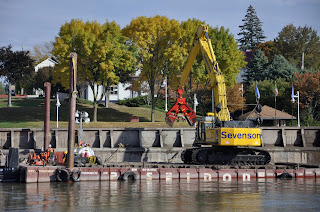 Approximately 300,000 cubic yards of sediment (equivalent to 15,000 dump trucks full) contaminated with PCBs and PAHs were removed from the river between August 2012 and early January 2013. As a result, river-goers will enjoy a deeper river with better navigation and access, and a cleaner habitat for fish and wildlife to thrive.
Approximately 300,000 cubic yards of sediment (equivalent to 15,000 dump trucks full) contaminated with PCBs and PAHs were removed from the river between August 2012 and early January 2013. As a result, river-goers will enjoy a deeper river with better navigation and access, and a cleaner habitat for fish and wildlife to thrive.
IISG’s Caitie McCoy worked with a local team throughout 2012 to provide information to stakeholders and the public on the project. She completed a study in March (PDF) with University of Illinois student Ada Morgan to learn how to communicate the sediment remediation project and its benefits to the public. The study helped the team tailor outreach products and messaging for everyone who uses and visits the river.
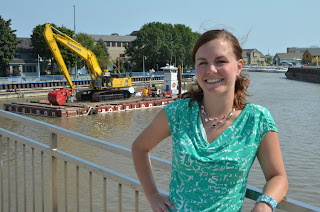 Work on the Sheboygan river will continue through 2013 to improve fish and wildlife habitats, both nearshore and underwater. “The dredging and habitat work are the last remaining actions necessary to take Sheboygan off a list of most polluted places in the Great Lakes,” wrote Caitie. “This has been an enormous team effort by the U.S. EPA and their partners, and we can’t thank the community enough for their support during the cleanup.”
Work on the Sheboygan river will continue through 2013 to improve fish and wildlife habitats, both nearshore and underwater. “The dredging and habitat work are the last remaining actions necessary to take Sheboygan off a list of most polluted places in the Great Lakes,” wrote Caitie. “This has been an enormous team effort by the U.S. EPA and their partners, and we can’t thank the community enough for their support during the cleanup.”
February 12th, 2013 by Irene Miles
Low temperatures and more characteristic winter weather have turned parts of Lake Michigan into a frozen lunar landscape – perfect for some chilly but scenic photography.
From Michigan Live:
 “What a difference one year can make.
“What a difference one year can make.
Last year Lake Michigan was nearly ice-free. But cold weather in 2013 has brought a return to the ice formations typical to West Michigan’s winter shoreline.”
Visit the link above for a great gallery of scenic shots from the frozen lakefront.
February 11th, 2013 by Irene Miles
Today’s blog post features a fun bit of physics from Wired.com’s science blog.
Writer Rhett Allain, professor at Southeastern Louisiana University, received an interesting question over Twitter – “What would happen if everyone on the planet jumped in the water?”
He writes:
“Let’s give a slightly refined version of the question.
‘If everyone on Earth went for a swim at the same time in Lake Michigan, how high would the water level rise?’
I have two primary assumptions to start with. First, I will assume that during this time the volume of water in Lake Michigan will be constant. So if the people make the water level rise, the water level will indeed rise instead of pushing water into the other Great Lakes. Second, I will assume that all of the humans in the lake are floating. If they aren’t ‘swimming’ or touching the bottom, then it will be easier to calculate the rise in the water level.”
Follow the link above for a fun Lake Michigan physics lesson.
February 8th, 2013 by Irene Miles
The frigid waters of Lake Michigan during a Midwestern winter may not seem very inviting to us, but some species spend a great deal of time there.
From Phys.org:
“On Nov. 2, 2010, Mueller documented 25,555 long-tailed ducks in Lake Michigan.
And on Jan. 20, 2011, 9,311 red-breasted mergansers were tallied.
 The data comes from the Lake Michigan Offshore Waterfowl and Waterbird Survey, a project initiated in 2009 by Mueller and Noel Cutright, both of the Western Great Lakes Bird and Bat Observatory in Belgium.
The data comes from the Lake Michigan Offshore Waterfowl and Waterbird Survey, a project initiated in 2009 by Mueller and Noel Cutright, both of the Western Great Lakes Bird and Bat Observatory in Belgium.
The work is designed to increase the understanding of key offshore Lake Michigan bird habitats, many of which have been lightly studied.”
Read more at the link above, including details about how the data they collect can help not only understand the presence and habitats of animals, but can guide safer development of energy production on the Great Lakes too.
February 7th, 2013 by Irene Miles
IISG’s Aquaculture Marketing Specialist Kwamena Quagrainie, who also directs the aquaculture economics and marketing program at Purdue University, was recently promoted to the position of Clinical Engagement Assistant Professor in Agricultural Economics. Dr. Quagrainie has been involved for many years in aquaculture marketing and outreach, helping numerous aquaculture operations get started or expand their business throughout the Midwest. He has also been involved in international efforts to promote and foster aquaculture operations throughout several African nations.
The Clinical Engagement professorship emphasizes transfer of applied research results to aquaculture communities small and large. The goal of this position is to promote active engagement in a field, which is the type of work that Dr. Quagrainie has been directly involved in for many years now. This promotion will give him even more opportunities to bring his expertise to aquaculture producers–helping businesses and communities grow.
February 5th, 2013 by Irene Miles
Illinois-Indiana Sea Grant is celebrating its 30th anniversary, and 30 years of working to protect and preserve the beauty and resources of Lake Michigan. But what is some of that work? What are some of the things that IISG does to understand, restore, and celebrate our Great Lakes resources?
We’re glad you asked. Our latest publication features 30 milestone achievements selected from the last three decades, all detailing ways that we support our mission to improve and protect the southern Lake Michigan area.
Visit the link to download your own copy of our 30 milestones, or contact us if you would like print copies to share with. And here’s to the next 30 years of keeping our Great Lakes great!
February 4th, 2013 by Irene Miles
 SeaPerch, a program that brings underwater robotics to classrooms and demonstrates how they can be used for educational purposes, recently held a workshop at the University of Illinois Hydrosystems Laboratory. IISG’s Robin Goettel and Terri Hallesy were among the presenters and they shared a number of educational materials that teachers could combine with their classes’ underwater robots.
SeaPerch, a program that brings underwater robotics to classrooms and demonstrates how they can be used for educational purposes, recently held a workshop at the University of Illinois Hydrosystems Laboratory. IISG’s Robin Goettel and Terri Hallesy were among the presenters and they shared a number of educational materials that teachers could combine with their classes’ underwater robots.
Thirteen Champaign-Urbana science teachers were in attendance to learn how to incorporate SeaPerch underwater robots into their classroom curricula. Coordinators from Naval Sea Systems Command – Crane STEM led the morning session to introduce the SeaPerch program, provide helpful tips for constructing the complimentary robot kit each teacher received, and discuss relevant resources for classroom use. Additional robots commonly deployed for scientific applications were also highlighted.
 Over lunch, participants interacted with U of I graduate students in engineering to discuss research topics and applications for their in-class lessons. Robin and Terri shared educational resources including two COSEE Great Lakes curriculum collections, Greatest of the Great Lakes: A Medley of Model Lessons, and a Fresh and Salt activity, “I, Robot, Can Do That!”
Over lunch, participants interacted with U of I graduate students in engineering to discuss research topics and applications for their in-class lessons. Robin and Terri shared educational resources including two COSEE Great Lakes curriculum collections, Greatest of the Great Lakes: A Medley of Model Lessons, and a Fresh and Salt activity, “I, Robot, Can Do That!”
During the afternoon session, a live demonstration of the SeaPerch robot was conducted and teachers had an opportunity to operate the SeaPerch robots in the large-scale laboratory facilities.
SeaPerch is a joint program of the Office of Naval Research and the AUVSI Foundation. Visit the SeaPerch homepage to learn more about bringing underwater robotics to the classroom, and for a calendar of upcoming workshops and events.
February 1st, 2013 by Irene Miles
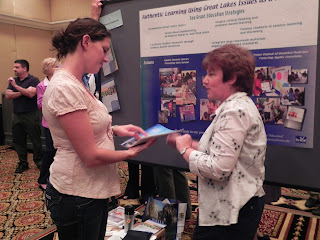 The Paul A. Funk Recognition Award provides a personal award to the winner as well as funds for their department to use in support of their work benefiting natural resources and human environmental systems.
The Paul A. Funk Recognition Award provides a personal award to the winner as well as funds for their department to use in support of their work benefiting natural resources and human environmental systems.
This year, Illinois-Indiana Sea Grant’s Robin Goettel won the award for her extensive educational outreach work, including the creation of numerous curricula for science teachers and others. In particular, the Fresh and Salt curriculum, the Greatest of the Great Lakes collection of model lessons, and The Medicine Chest have helped to inform, engage, and education over 100,000 students about environmental science related to the Great Lakes.
Robin isn’t afraid to get totally immersed in her environmental education work either, as this excerpt from her nomination proves:
“No description of Robin would be complete without a mention of Zelda the zebra mussel, a ‘spokesmussel,’ as Robin describes her. Zelda is a costume that Robin is not afraid to pull out at public events. While maybe not quite ready for Disneyworld, Zelda draws a crowd. People start with a laugh, are compelled to ask questions, and end up with a better understanding of invasive species for the unconventional approach.”
Those examples don’t begin to touch on the work that Robin has engaged in throughout her many years with the program–from direct engagement with students of all grade levels, to educational displays at some of the Midwest’s biggest events, to forging partnerships with other environmental organizations to better educate, inform, and engage people in protecting and preserving natural resources.

Robin’s many years of work on environmental issues, and her dedication to fostering ever higher levels of science education for students of all ages, make her a terrific and very deserving choice for this award.
IISG’s Caitie McCoy attended the Seventh International Conference on Remediation of Contaminated Sediments last week to present her community outreach work with the Great Lakes Legacy Act (GLLA). The conference traditionally features environmental scientists and engineers, but that is changing. “We are starting to see more attention paid to community engagement at these types of conferences,” Caitie tells us. “Technical project managers realize that projects are easier to implement when the community understands and supports the work, and so they’re eager to learn from professionals who specialize in community engagement and stakeholder involvement.”
 Caitie will expand her programming throughout the Grand Calumet River community in 2013, as the Legacy program begins another phase of dredging this summer.
Caitie will expand her programming throughout the Grand Calumet River community in 2013, as the Legacy program begins another phase of dredging this summer.




